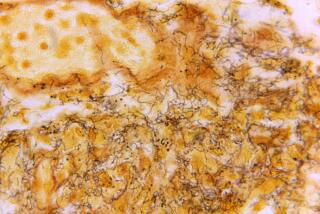The Plague That Loves Ignorance
New estimates of the numbers of people infected in the AIDS epidemic are lower than expected, a sign at least that education among homosexuals has changed behavior and reduced spread of the disease.
Even so, the new figures also reflect continued rapid growth of infection among other populations, including drug users and heterosexuals. Current estimates are that more than 800,000 Americans are infected with HIV, including more than 120,000 in Los Angeles and Orange counties.
The total of new cases is expected to increase each year through 1993. President Bush is considering a $100-million increase in federal spending on AIDS, money that is desperately needed. By most accounts, this will not be enough to meet demands now that it is clear that early intervention with AZT can extend the lives of those infected with the human immunodeficiency virus (HIV) that causes AIDS.
The lowering figures appear to be further evidence of the success of education campaigns to persuade the gay community to adopt safer sex practices. But there are no signs that similar educational efforts, particularly those directed at drug users, blacks and Latinos, have been effective. Among blacks and Latinos, there remains extensive denial of high-risk homosexual practices, especially among so-called bisexual males, and a lack of community leadership from church and civic groups that could facilitate wider acceptance of condoms and discourage promiscuity. In addition, the shortage of funding for drug rehabilitation programs has handicapped efforts to educate intravenous drug users on safer sex.
The importance of early detection of HIV infection has been underscored in recent months by new evidence of the efficacy of early treatment. Insurance coverage of this treatment, unfortunately, is not generally available pending certification by the Food and Drug Administration. Nevertheless, those who have been diagnosed through testing now can undertake the new life-extending therapies utilizing regular monitoring of the T4 white cells to determine the appropriate timing of low doses of AZT. But those ignorant of their infection, including thousands who resist testing, remain a risk to their sexual partners and are also denying themselves the advantages of the new treatment.
More to Read
Sign up for Essential California
The most important California stories and recommendations in your inbox every morning.
You may occasionally receive promotional content from the Los Angeles Times.










